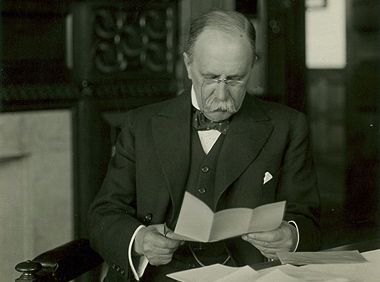
William Osler keeping up-to-date pre-blogosphere. From the Osler Photo Collection, CUS_064-048_P.
The world of academic blogging keeps getting better and better and, indeed, a more and more important way of engaging with scholarly communities. Here are just a couple highlights for the historian of medicine.
Center for Medical Humanities blog: This longstanding blog from the Centre for Medical Humanities at Durham University is definitely one for the RSS. It’s an important distributor of calls for papers and announcements of conferences, talks, and new publications in medical humanities and history of medicine. It’s also a collaborative blog that features scholarly content from guest contributors ranging from profiles of researchers to introductions to current work.
Remedia is a beautifully designed new blog devoted to all things history of medicine, particularly topics that help to illuminate contemporary issues. Entries so far touch on obesity and death and dying (see, for example, this interview about assisted suicide) and although it’s young, it looks like a promising blog to follow.
Contagions: Subtitled “Thoughts on historic infectious diseases,” this is an impressive blog by biologist Michelle Ziegler of Saint Louis University that provides an account on her work on “old germs” and public health. Current research topics of her include a bioarcheology of plague, particularly a study of the early medieval plague of Justinian, and inflectious disease in the Americas. Have a look at her entry on gerbil plague!
Next in our series of professor blogs comes William Eamon’s site, featuring his blog Labyrinth of Nature: “occasional thoughts and random reflections on the history of Renaissance science.” Eamon, a professor at New Mexico State University and author of two excellent and eminently readable books on Renaissance scientific and medical culture, writes a great blog. The posts are on various topics or events in early modern medicine or science; all are illustrated with images and provide further readings. Check out his study of 16th century Italian surgeon Leonardo Fioravanti and his drug of choice, Precipitato (mercuric oxide), which he prescribed liberally for purgation.
Medical History: In this blog, our host, Dr. Turkey, obstetrician by day and historical storyteller by night, shares photographs, anecdotes, and diagnoses (see, for example, her brief history of anesthesia or her opinion on Attila the Hun’s death. A fun read for the historically curious.
The Medicine Chest is devoted specifically to early modern and 18th century medicine from Dutch historian Marieke Hendriksen. Her posts span a range of subjects from medical material culture to pharmacy, and topics from harelips to mercury.

